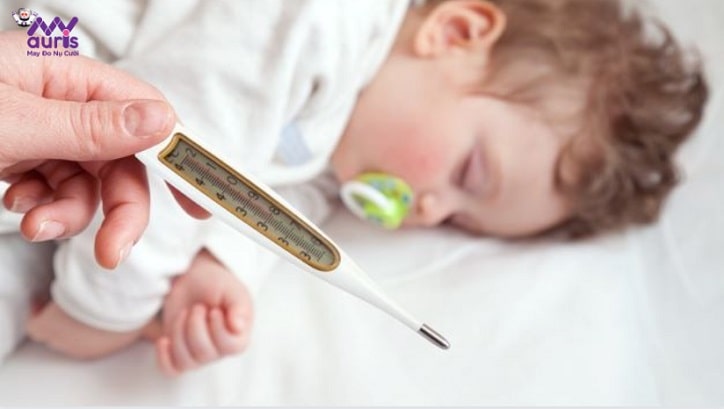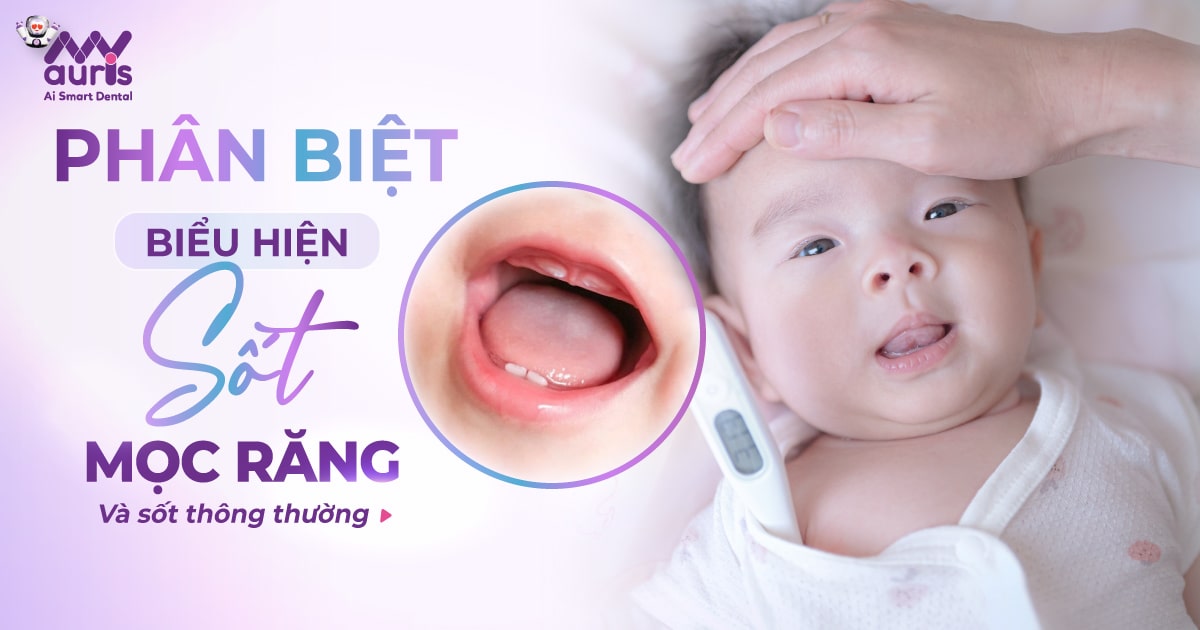Teething fever is one of the common symptoms in children during the period of first teething. At the same time, many parents are often confused between the signs of teething fever in newborns and fever due to other illnesses, leading to lack of timely treatment and affecting the child’s health. This article will help you distinguish the symptoms of teething fever.
When do children start teething?
During the development of children, parents certainly always remember the memories when children start teething. That is a sign for us to monitor the child’s growth day by day. Therefore, the first teeth usually appear when children are from 4 months to 7 months old.
Normally, the lower incisors are often the first teeth of young children and when teething begins. Among them, we must mention some phenomena of children having fever due to teething or drooling or chewing and gnawing on junk around them, especially children who are fussy or stop feeding. These are very normal symptoms, so parents do not need to worry too much.

Distinguish between teething fever and normal fever like that
There are many causes of high fever in infants, of which teething is one of the common causes. However, signs of teething fever in infants are easily confused with fever of illness. Below are some symptoms in newborns that parents need to pay attention to:
- Children with high fever: Depending on each child’s constitution, symptoms of fever during teething will be different. In cases where children have a mild fever of about 37.8 – 38 degrees Celsius, or even no fever. On the contrary, some cases can have a fever as high as 39 degrees Celsius;
- Symptoms in children’s gums: When children grow teeth, if parents clean their teeth, they will see the child’s gums are swollen, red, and when touched, you can feel the tooth buds emerging;
- Children have itchy gums so they often bite, chew or hold fingers or toys in their mouth;
- More drooling occurs, which can spill around the mouth, chin, neck, causing temporary rashes in this area, etc.
In addition, during this period, children willThere will be many changes in physiology and personality, children will be irritable and cry. In particular, children often tend to have trouble sleeping, even have poor feeding, anorexia and stop eating.
However, parents need to distinguish between common fevers in children. Normally, children with fever will often have symptoms such as chills or night sweats. Unlike the phenomenon of children having a fever due to teething, in this case, the child may have a runny nose and sore throat. The cause of fever in children is because the body is attacked by viruses and bacteria, causing fever.
Some other reasons can include: the baby has an immune system disorder, a disorder of the body’s temperature regulation center, etc. In addition, fever will have some side effects after the baby is vaccinated.

When do you need to see a doctor for a child with teething fever?
This will be a question that many parents wonder about, because many people think that when children have a fever during this period, they have a general feeling of anxiety and signs of diarrhea. Therefore, is this really a sign of teething in children, or is it due to other diseases?
So, if a baby is teething, it shows signs of crying, restlessness, poor feeding, eating less or skipping meals, usually lasting about 2 – 3 days before the teeth start to grow. However, when the teeth grow in, the above symptoms also disappear. However, if your child still has the following signs, take him or her to the nearest medical facility, because the child may have a fever due to illness, not a fever due to teething:
- Children under 3 months old and fever over 38 degrees Celsius;
- Is younger than 3 months old and has a fever of 39 degrees Celsius or higher;
- The child has a continuous fever that does not cool down, and is accompanied by signs such as diarrhea, vomiting, rash;
- Once the teeth have erupted, the symptoms of fever due to teething remain and are even worse;
- Children sleep a lot and are lethargic or the symptoms do not improve, especially blood in the stool;
- Child has weight loss or significant weight loss.

How to properly care for your baby when he shows signs of teething fever
- When children grow about 2-3 teeth, parents can use a piece of gauze wrapped around their finger, then dip it in warm water to clean the child’s teeth every morning;
- When more teeth have grown and your baby starts eating solid foods, you can use a soft toothbrush to brush your baby’s teeth;
- There are many soft toothbrushes and toothpaste for babies under 12 months old sold at baby stores that you can choose from. choose;
- If your baby has sore gums due to teething, you can use a silicone ring for your baby to chew on and wash your finger. aria-level=”1″>Note, always wash your hands before rubbing your child’s gums;
- To reduce gum pain, you should remove the bottle ring or a clean towel You should not put it in the freezer because it will cause the tool to crack;
- When buying chewing rings for children, you should not buy ones that contain liquid inside because this will easily cause the child to swallow and harm their health;
- Do not use alcohol, gel or any medicine to rub on your child’s gums;
- If you give your child pain relievers, follow the doctor’s instructions;
In addition, parents should dress their children in comfortable, sweat-absorbent clothes to help them recover quickly. Furthermore, while your child is teething, don’t forget to thoroughly clean your child’s teeth. Especially after breastfeeding or eating, clean the baby’s gums and wipe the baby’s drool!
Above are the symptoms of teething fever in children that parents need to pay attention to. High fever in children can cause dangerous health complications. Therefore, parents need to clearly understand the signs of teething fever and normal fever to have timely treatment. Besides, supplement appropriate nutrients for children!
Kim Dung





